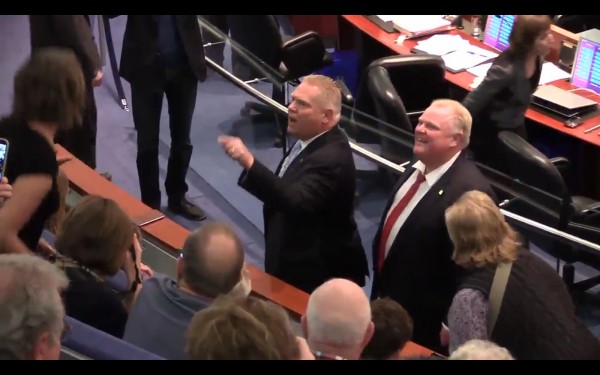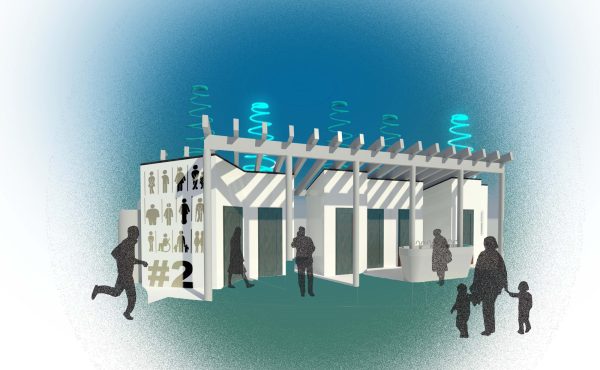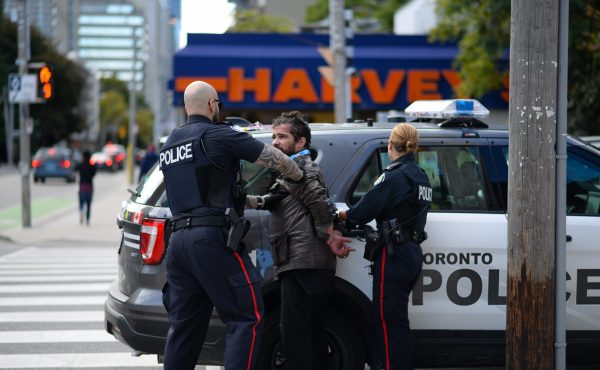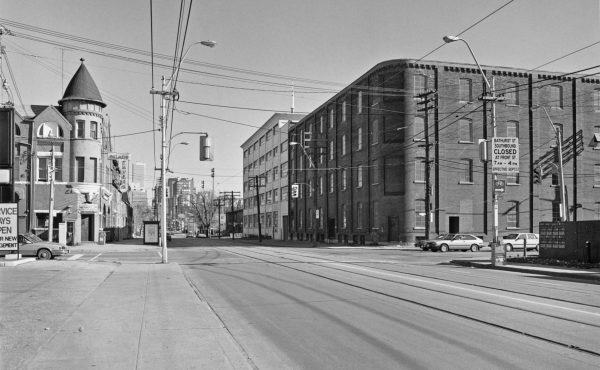Doug Ford, during the engineered mayhem of yesterday’s council meeting, challenged the provincial government to call an election.
Okay, Doug, I’ll bite.
My proposal: that Kathleen Wynne’s Liberals push ahead with two key legislative moves to restore confidence in the province’s largest municipal council.
First, pass an order-in-council that would require the City of Toronto to hold a general municipal election before the end of April, 2014, with the next one scheduled for October, 2018.
Secondly, amend the City of Toronto and Municipal Elections acts to allow ranked ballot elections, as well as provide about 250,000 permanent residents with the right to vote, as recommended by council last July.
It’s safe to assert at this point that council is in the midst of a full-blown governance crisis. So let’s not waste it. The province can leverage this chaos to accelerate a program of democratic reform that is council-supported and forward-thinking, and, as a bonus, may well rid us of the scourge of the brothers Ford once and for all. After all, Ford’s 2010 election, and the pounding migraine that has ensued, represents perhaps the best argument I’ve ever heard against first-past-the-post elections.
Here’s the case in favour of an accelerated election: the Fords’ stunts at council tell me that these political goons are going to do everything in their power to derail the work of local government in Toronto. The threatened lawsuit is just window dressing — what they crave is televised mud-wrestling and the slavish attention of the world’s media. The CNN crews will go home eventually, but the Fords are nothing if not bull-headed. I have every confidence they can keep up this lunacy until next fall.
So despite council’s moves in the past several days to strip Ford of his delegated authority, it can’t muzzle him. There was apparently no will to lock the doors of the mayor’s protocol lounge and hide the keys.
Does that mean we get another of these highway pile-ups every month? Will Ford try to throw a spammer into the work of the executive committee, or turn up at committee meetings with lists of inane questions, like the Energizer bunny on meth?
From where I sit, this session of council is now effectively over. Yes, the councillors may convene to make decisions. But debates on every single issue of substance will be distorted or derailed by the Fords’ histrionics (not to mention the political positioning of Karen Stintz and Denzil Minnan-Wong). It’s time to throw the breaker switch and get on with an election we desperately need to have.
None of this is to say that there aren’t compelling arguments against an accelerated and foreshortened race. Longer campaign periods provide lesser-known candidates with more time to muster supporters, gain media profile, and raise funds. There are more debates, and, in theory, there is more scrutiny of the candidates.
In terms of this specific situation, moreover, one could argue that sticking with Ford until next October is the political equivalent of the you-broke-it-you-own-it rule. We collectively put a uniquely unqualified candidate into the city’s most visible and difficult job. So now we should be prepared to sleep in the bed we made.
Point is, the longer voters have to observe the Fords make a complete mockery of local democracy, the more cautious they will be when they have to cast their next vote. Or at least, so the theory goes.
Lastly, there’s still the possibility that Ford may, at some point in the next year, find himself perp’ walked into Old City Hall after the police charge him with a criminal code offense related to Sandro Lisi’s alleged drug dealing or the suspected extortion attempt on the man who apparently had the video. Or what if the charge involves something much darker: Anthony Smith’s murder, Renata’s bruises? If or when such a day arrives, the electoral calculus will abruptly fade to black.
Despite all the arguments in support of the existing electoral timetable, I find myself gravely concerned about the long-term reputation damage the Fords are inflicting on the city, as well as the inevitable erosion of public confidence in the work of municipal government.
As is often noted about attack ads, the point of the exercise is always to create so much negative energy around politics that many voters will tune out. And when they do, the party best positioned to mobilize its hardcore base walks away with a narrow plurality garnered from a low-turn-out race.
That cynical outcome, in effect, is what the Fords were doing yesterday when they began barking at people in the spectators’ gallery and galloping around the council floor. To those who weren’t present, they are saying, in effect, “Don’t come down here, because we’re a pair of tough-ass bastards and we’re going to be in your face, you bunch of pinko, unemployed losers.”
And to their supporters and the people who just enjoy the spectacle of it all, they’re saying, “More where that came from.”
The city desperately needs to change the channel, and that is a point of broad consensus among the leaders of all three political parties. For that reason, Wynne has it well within her power to bring all this stupidity to a head without abrogating local democracy and possibly even enhancing it.
God knows we’re all engaged. So, as the mayor said last week, let’s just do it.
screen-capture from Globe and Mail video






7 comments
With all due respect, no. Absolutely, no. It’s both an unprincipled response, and good for the Fords to boot.
Across this province, municipalities have elections every four years. The moment we start changing our election cycle in the province’s largest city just to suit two men’s personal whims and desires is the moment we surrender to the ‘hostage-taking’ situation that everyone is already afraid of. Worse, if we start attaching major democratic reforms to a snap election without taking any time to prepare voters politically or logistically for the change, we risk setting back the cause of further reform for decades simply for the sake of expediently “using a crisis.” We also feed the fire, by training Ford’s moderate supporters to believe there really is an “elite” conspiracy to change the rules to hurt him and him alone.
And: remember, the delaying tactics Ford is using on the Council floor were always available to any councillor – and they always should be available in a democratic society. So it’s up to Council – and supporters of the various anti-Ford critics within – to think its way around those tactics rather than simply crumpling and demanding new legislation at the first sign of any resistance. So what if the meetings take a few extra days? That’s what Council is paid for, and we wouldn’t have complained if the same tactics were used to delay the more absurd parts of Ford’s agenda.
If Ford is going to be charged with something disgraceful, he’s going to be charged. Changing the law across Ontario to allow councillors to sanction the likes of Ford or Fontana is one thing, but changing our election cycle arbitrarily in one city to anticipate *a possibility* is absurd. And let’s not kid ourselves: the disgrace will be there either way. By way of comparison, look at Kwame Kilpatrick’s lingering, post-mayoral front-page status across America; that’s what we’re in for. As with Kilpatrick, Ford’s presence in or out of his office won’t make those headlines go away.
Nor will our disgrace won’t be any smaller if there’s a circus of an early election campaign thrown into the middle of that conversation – especially since declaring an early election on Ford’s timetable substantially increases the odds that he’ll be re-elected. Bear in mind that large parts of the city still believe he’s some sort of supermanager, a civic reincarnation of Harold Geneen or Henry Ford. Few of Ford’s critics have been wise enough or savvy enough to invest any time in destroying that hilarious fiction. An early election wipes out any chance of making up that lost ground for good, forcing opponents to run on what the Ford’s want to run on: his “personal” problem.
So why do this, if there are so few certain benefits from doing so? Because *Doug Ford* asked for an early election? Is that why?
With those limitations in mind, the appropriate response to all of this is to stop trying to find a convenient way around an inconvenient problem. There is no instant gratification here – not for Ford’s critics, anyhow, even if he’s getting plenty of it himself. For the rest of us, there is only the hard road to October 27th, 2014, so let’s start our way down it without further delay.
– BFK
This is the worst of all options, the province acts unilaterally, the electorate gains no additional accountability mechanism (recall or impeachment) and the four year time frame for municipal elections is maintained. A much better scenario would be the province passing recall / impeachment / non-confidence (with or without the simultaneous creation of a party system at the municipal level) and changing the municipal election cycle to every three years fixed.
“Ford’s 2010 election, and the pounding migraine that has ensued, represents perhaps the best argument I’ve ever heard against first-past-the-post elections.” No, it’s not. Ford didn’t sneak up the middle of a race between two polarized opponents. He won with over 47% of the vote, less than 3 points shy of a majority. If we had a ranked ballot system, it is unrealistic to think that 100% of the people who didn’t vote for Ford would have had Smitherman ranked above him. Some fringe candidate voters might have preferred Ford’s extremism over Smitherman’s banality. Some Pantalone voters may have had it out for Smitherman on the merits of his record as a cabinet minister. Even if 83% of those who voted for neither of the top two candidates had ranked Smitherman over Ford as a secondary choice, Ford would still have won.
To be clear, I strongly support ranked ballots. But I support them for reasons of the general quality of elections, not the results of one in particular.
Do it because these Frod Bros won’t leave until the electorate votes them out. It should have happened back in 2012 when Chief Justice Hackland ruled Ford broke “The Municipal Conflict of Interest Act”.
I agree with BFK. Let Rob campaign full-time from now till October or at least from January 2nd. His mother told us he needs to keep busy; he likes campaigning.
Also, since he got 47% in 2010,I think he would have captured another 3% via a ranked ballot system.
“Respect for wives”
The Fords have been campaigning non-stop since the end of 2011. Declaring an early election would be rewarding bad behaviour.
To my mind, a more convincing argument against provincial interference is that it threatens Toronto’s autonomy, and its transition from a medium sized city (with few powers) to a big city. Other big cities in the world have argued for and won more power to govern themselves, so they have the flexibility to levy taxes appropriate to the services they deliver, and the infrastructure that supports their citizens. For example, New York city and Chicago can both levy different forms of taxation to fund municipal spending. Property taxes are a hangover from feudalism, yet before David Miller’s council they were the only form of raising money, apart from taking on debt. The amended City of Toronto Act changed that, and allowed Toronto to levy taxes on things it wanted to discourage: land transfer to cool an overheated real-estate market, and the VRT to discourage owning multiple vehicles. While neither of these taxes are perfect, they are a step in the right direction. If council were to acquiesce to the Premier’s offer to help right the ship, it would be a tacit admission that the city was unable to effectively govern itself; a ready-made excuse for the province to decline the discharge of any further powers to city council. Existing models of large North American cities have greater powers for self-direction. Let’s allow council to show that it can salvage what is left of this term, so that future (more united and responsible councils) can push the province for the tools and flexibility Toronto needs for future growth.
I do think that the province should move to implement ranked ballot voting though, and allow municipal votes to people with permanent resident status. It’s good policy, and it would allow people to focus on policy for the city rather than the crazy train.
I keep thinking what Toronto Council should actually do is declare “non-confidence” in itself.
The model of civic governance is the Mayor is supposed to present an Agenda at city hall, build support for it, and act as a champion for governance.
It’s obvious that Ford has gone from having the support to execute the agenda to no longer having it. No Councillor has a proper mandate to institute city-wide reforms.
What the council should do is reorganize itself under the Westminster model, appoint a non-politician to act as our head of the state, and then let whatever councillor has the most support serve as mayor. If this was the case, Ford would have been internally purged from executive power long ago… in fact he probably wouldn’t have had the support to get there to begin with because he’s not much of a team player, and his lack of skills in this arena has been evident for some time.
So, that’s my solution “non confidence” then elections, and eliminate the position of city-wide elected mayor.